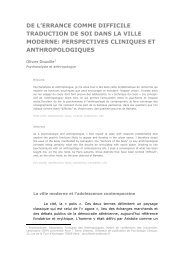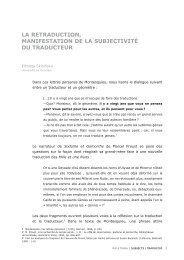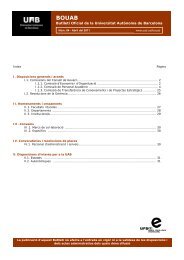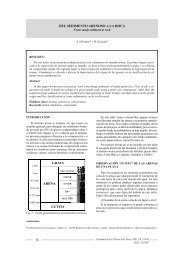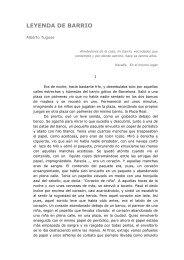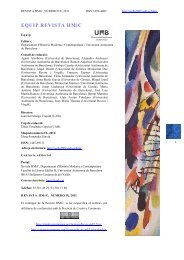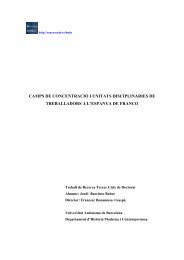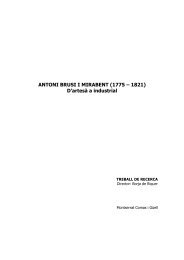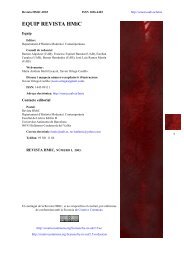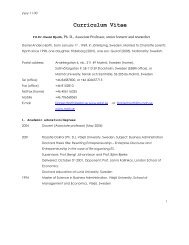EQUIP REVISTA HMiC - Universitat Autònoma de Barcelona
EQUIP REVISTA HMiC - Universitat Autònoma de Barcelona
EQUIP REVISTA HMiC - Universitat Autònoma de Barcelona
You also want an ePaper? Increase the reach of your titles
YUMPU automatically turns print PDFs into web optimized ePapers that Google loves.
The mo<strong>de</strong>rnisation of China and the Chinese critique of mo<strong>de</strong>rnity<br />
that construct it, among many others. In East Asia, especially in China, there is a new,<br />
alternative and <strong>de</strong>veloping tradition whose hypotheses and conclusions are waiting to be<br />
integrated into the European aca<strong>de</strong>mic framework of applied discourse analysis and<br />
comparative socio-cultural studies.<br />
In traditional Chinese political thought (Guo 1975; Hsiao 1979; He, Bu 1998; Lewis 1999),<br />
the establishment of an official discourse that could or<strong>de</strong>r society was a major concern of both<br />
thinkers and policy-makers alike, and the Chinese imperial examinations, <strong>de</strong>signed to select the<br />
bureaucrats necessary for the administration of the government, created a system that combined<br />
intellectual and literary competence with the administration of power, creating a situation of<br />
complicity between intellectuals and policy-makers that continues to be important today. The<br />
construction of the mo<strong>de</strong>rn discourse of power at the national and international level is being<br />
carried out both in government and in aca<strong>de</strong>mic circles. In the absence of a highly <strong>de</strong>veloped<br />
and in<strong>de</strong>pen<strong>de</strong>nt civil society, which is still incipient in China today, mo<strong>de</strong>rnisation and the<br />
translation —or recreation— of “Western” mo<strong>de</strong>rnity in the Chinese context is to a large extent<br />
the result of <strong>de</strong>bates among intellectuals who are also advisers, such as Yu Keping, on politics,<br />
or Hu Angang, on economics, or Wang Hui, who takes a more historical and philosophical<br />
approach to the discourse of mo<strong>de</strong>rnity, both “Western” and Chinese. Such members of the<br />
Chinese intelligentsia constitute a kind of <strong>de</strong>fault civil society.<br />
Over the last two centuries the discourse of mo<strong>de</strong>rnity that had been <strong>de</strong>veloped in “the West”<br />
has confronted the Chinese tradition, with traumatic and unequal results that still play a major<br />
role in China’s perception of the EU and of the United States (as well as Japan). As a result, an<br />
analysis of the genealogy of the discourse of mo<strong>de</strong>rnity that came from the “West” is a<br />
necessary first step in the process of making a comparative analysis of contemporary Chinese<br />
civic and political discourse.<br />
Shifting paradigms in the current <strong>de</strong>bate on mo<strong>de</strong>rnity and international<br />
relations<br />
Mo<strong>de</strong>rnity in the “Western” context is a product of the historical and cultural forces that<br />
produced the Enlightenment, forces of European histories and cultures that were different from<br />
those of China. This European mo<strong>de</strong>rnity was introduced into China’s history and culture by the<br />
force of arms, provoking a traumatic experience that has lasted for more than a century and half,<br />
and it would be impossible to un<strong>de</strong>rstand the Chinese reaction to mo<strong>de</strong>rnisation and mo<strong>de</strong>rnity<br />
without bearing this fact in mind. Something very similar happened in the case of Japan.<br />
Resistance to accepting the paradigms of European mo<strong>de</strong>rnity as being “universal” is one of the<br />
consequences of Asia’s colonialised past, and of Asia’s postcolonial relationship with past<br />
imperial powers, that sparked off the <strong>de</strong>bate about “Asian values”. From the Asian point of<br />
view, the universality bestowed upon Enlightenment values by their authors became a<br />
justification of imperialism and its catastrophic consequences. As a result, a critical stance<br />
toward Enlightenment values has become a standard component of current Asian thinking.<br />
Current geostrategy is being <strong>de</strong>bated from the point of view of different paradigms in<br />
different contexts. Some situate the “new world or<strong>de</strong>r” in a post-Cold War framework, others<br />
in postcolonialist or postmo<strong>de</strong>rn frameworks. Some “Western” voices speak of “a shock of<br />
civilisations” which threatens “the end of history” which they consi<strong>de</strong>r to have been achieved<br />
http://seneca.uab.es/hmic Revista <strong>HMiC</strong>, número IV, 2006<br />
8



